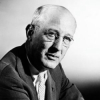Bruce Catton

Bruce Catton
Charles Bruce Cattonwas an American historian and journalist, best known for his books on the American Civil War. Known as a narrative historian, Catton specialized in popular history, featuring colorful characters and historical vignettes, in addition to the basic facts, dates, and analyses. Although his books were well researched and supported by footnotes, they were not generally presented in a rigorous academic style. He won a Pulitzer Prize in 1954 for A Stillness at Appomattox, his study of the final...
NationalityAmerican
ProfessionHistorian
Date of Birth9 October 1899
CityPetoskey, MI
CountryUnited States of America
Soldiers who had been in the army long enough to know what a bloody swindle war really is would begin to feel that army life was really kind of fun, as long as [General Philip] Sheridan was up front.
Here was the greatest and most moving chapter in American history, a blending of meanness and greatness, an ending and a beginning. It came out of what men were, but it did not go as men had planned.
Nathan Bedford Forrest ... used his horsemen as a modern general would use motorized infantry. He liked horses because he liked fast movement, and his mounted men could get from here to there much faster than any infantry could; but when they reached the field they usually tied their horses to trees and fought on foot, and they were as good as the very best infantry. Not for nothing did Forrest say the essence of strategy was to git thar fust with the most men.
Between 1861 and 1865, Americans made war on each other and killed each other in great numbers - if only to become the kind of country that could no longer conceive of how that was possible.
What began as a bitter dispute over Union and States' Rights, ended as a struggle over the meaning of freedom in America. At Gettysburg in 1863, Abraham Lincoln said perhaps more than he knew. The war was about a new birth of freedom.
The 1860 election became a referendum on the southern way of life.
Shiloh had as many casualties as Waterloo, and yet there were another 20 Waterloos to come.
Like most Rebel soldiers, Sam Watkins owned no slaves.
The Confederate Constitution was almost identical to that of the United States.
What a general could do, Thomas did; no more dependable soldier for a moment of crisis existed on the North American continent, or ever did exist... Thomas comes down in history as the Rock of Chickamauga, the great defensive fighter, the man who could never be driven away but who was not much on the offensive. That may be a correct appraisal, Yet it may also be worth making note that just twice in all the war was a major Confederate army driven away from a prepared position in complete rout - at Chattanooga and at Nashville. Each time the blow that routed it was launched by Thomas.
It began with one act of madness, and it ended with another. John Brown heard history's clock strike in the night and tried to hurry dawn along with gunfire; now John Wilkes Booth heard the clock strike, and he tried with gunfire to restore the darkness. Each man stood outside the human community, directed by voices the sane do not hear, and each kept history from going logically... The line from Harper's Ferry to Ford's Theater is a red thread binding the immense disorder of the Civil War into an irrational sort of coherence.
The enduring realization that when a great challenge comes, the most ordinary people can show that they value something more than they value their own lives. When the last of the veterans had gone, and the sorrows and bitterness which the war created had at last worn away, this memory remained.
A singular fact about modern war is that it takes charge. Once begun it has to be carried to its conclusion, and carrying it there sets in motion events that may be beyond men's control. Doing what has to be done to win, men perform acts that alter the very soil in which society's roots are nourished.
The Civil War was fought in 10,000 places, from Valverde, New Mexico, and Tullahoma, Tennessee, to St. Albans, Vermont, and Fernandina on the Florida coast. More than 3 million Americans fought in it, and over 600,000 men, 2 percent of the population, died in it.